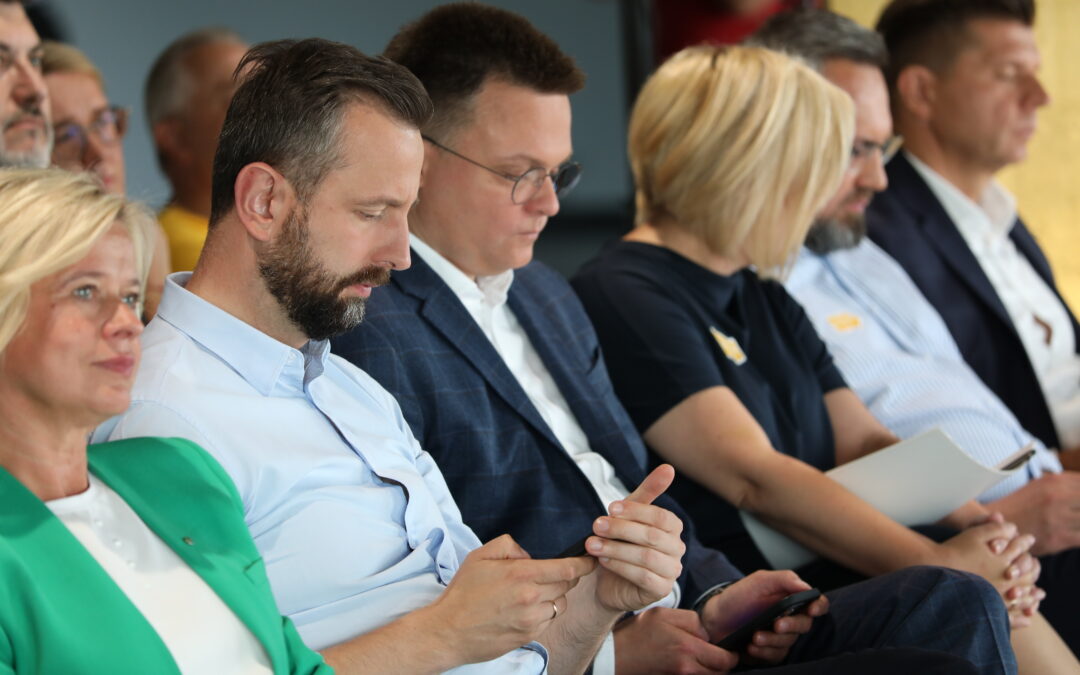Polish government figures have denied suggestions by a former head of the Central Anticorruption Bureau (CBA) that officers were ordered to surveil opposition figures ahead of this month’s parliamentary elections.
The claims were made over the weekend by Paweł Wojtunik, who led the CBA from 2009 to 2015. He was appointed under the former government and lost his position under the current (but likely outgoing) administration. In 2019, he stood as an election candidate for the opposition.
Speaking to broadcaster TVN on Saturday, Wojtunik directed a number of questions towards Mariusz Kamiński, the interior minister and coordinator of the security services.
In particular, he asked whether it was true that, two days before the 15 October elections, during a CBA briefing instructions were issued regarding “mass” surveillance of “representatives of opposition groups”.
Paweł Wojtunik w @faktypofaktach z pytaniem pod adresem Mariusza Kamińskiego: Czy prawdą jest, że podczas odprawy w Lucieniu dwa dni przed wyborami zapadły decyzje, aby w kontekście wyborów parlamentarnych masowo stosować kontrolę operacyjną wobec przedstawicieli ugrupowań…
— tvn24 (@tvn24) October 21, 2023
Speaking later to another media outlet, Radio Zet, Wojtunik said he had asked the questions “based on information obtained from several sources”.
He said he was “unable to assess the credibility” of the claims himself but that they must be “clarified, denied or confirmed as soon as possible”.
Asked if he thought that such surveillance would be intended to help cause divisions between opposition groups – who want to form a new government together after the elections – Wojtunik said that that is the “most likely” explanation and he “can’t imagine any other purpose”.
We answer 12 questions about Poland's new government, including:
1. How will it be formed?
2. Will it be stable?
3. How will it tackle rule of law and abortion?
4. Can it unlock EU funds?
5. Will it face presidential vetoes?Read our full analysis here⬇️https://t.co/oLK33waftV
— Notes from Poland 🇵🇱 (@notesfrompoland) October 23, 2023
An unnamed source speaking to Gazeta Wyborcza, a leading liberal daily, said that “the idea was to obtain compromising materials intended to disrupt coalition talks or even make them impossible”. The surveillance was supposedly intended to target in particular the centre-right Third Way (Trzecia Droga) group.
Michał Szczerba, an MP from the centrist Civic Coalition (KO), the largest opposition group, told TVN that he believes the aim was to help the ruling national-conservative Law and Justice (PiS) “fish among new MPs” to find some who could be tempted to defect and help PiS gain a parliamentary majority.
On Friday, PiS chairman Jarosław Kaczyński claimed during a speech that Third Way had arisen with Russian backing and that Civic Platform (PO), the main force in KO, was created to pursue German interests. Kaczyński suggested that these facts should be “a subject of interest for the security services”.
In his first remarks since the ruling party lost its majority at Sunday's elections, Jarosław Kaczyński has suggested that "external forces" – especially Germany and Russia – are behind the opposition parties now set to form a new government https://t.co/iHuHEMmUik
— Notes from Poland 🇵🇱 (@notesfrompoland) October 21, 2023
On Sunday, Gazeta Wyborcza published a copy of what it says was a “warning message” sent by an officer in the security services to an opposition politician. Both the sender and recipient have not been named.
The message advised the recipient to ensure that all “important meetings be held without telephones”, which should be left in “a box by the entrance”. It also suggested there was a plan for the security services to “make conservations available to the media”.
The allegations of surveillance have been met with anger from opposition MPs. Piotr Zgorzelski, a deputy speaker of parliament and member of the Third Way, has pledged to establish a parliamentary commission to investigate the claims.
#ZamachNaWybory
Wojciech Czuchnowski:
Rozkaz: podsłuchiwać opozycję! "Wyborcza" ujawnia, jakie polecenie dostali agenci.
Czy na dwa dni przed wyborami zapadła decyzja o założeniu podsłuchów politykom opozycji? Tak twierdzi Paweł Wojtunik, były szef CBA. https://t.co/4ieXt3uNNb pic.twitter.com/RyMFQ4MTEI— Aleksandra Zawisza-Wiatrowska (@AleksZawisza) October 22, 2023
However, government figures have denied the allegations. Wojtunik has not “provided a shred of evidence” to support his claims, noted Marcin Horała, a deputy minister. “Wojtunik lies like [Donald] Tusk,” tweeted Maciej Wąsik, a deputy interior minister, referring to the leader of PO.
“It’s not true,” said Stanisław Żaryn, deputy minister for Poland’s security services and their main spokesman, quoted by the Polish Press Agency (PAP). “The security services operate within the limits of the law…Wojtunik is spreading lies about the alleged surveillance of the opposition during the elections.”
Kamiński, the interior minister and coordinator of the security services, was in 2015 found guilty of abusing his powers when he served as head of the CBA from 2006-2009. He maintained his innocence and was set to appeal, but before that happened Kamiński received a presidential pardon.
Earlier this year, a European Parliament enquiry found that Poland has used Israeli-made Pegasus spyware as part of “a system for the surveillance of the opposition and critics of the government – designed to keep the ruling majority and the government in power”.
Spyware has been used in Poland to "systematically surveil the opposition" in order to "keep the government in power", an EU report has found.
"The information harvested is used in smear campaigns through government-controlled state media," it adds https://t.co/xlrZ0O8Qe4
— Notes from Poland 🇵🇱 (@notesfrompoland) May 10, 2023

Notes from Poland is run by a small editorial team and published by an independent, non-profit foundation that is funded through donations from our readers. We cannot do what we do without your support.
Main image credit: Slawomir Kaminski / Agencja Wyborcza.pl

Daniel Tilles is editor-in-chief of Notes from Poland. He has written on Polish affairs for a wide range of publications, including Foreign Policy, POLITICO Europe, EUobserver and Dziennik Gazeta Prawna.



















